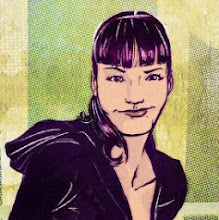The metaphor of "ordinary language" as the soil and of there being a displacement made me think of a bulb. Derrida uses the words "rupture," and that made me think of something very similar to the destabilization of the image of reality. You have a bulb, planted in the ground, then you apply some water and all of the life inside the bulb bursts out and spreads until the bulb is no longer the center. The roots take up a life of their own and they grab hold of the ground, but the life doesn't stop there, it pushes its way up to the surface to the sunlight, where it learns to feed itself without having to explain why it does so. Essentially, I see poststructuralism and deconstruction as a way to get out of the damned cave.
And the things outside are scary, and messy and chaotic.
The professor I mentioned before in the previous blog gave a lecture on the limits of our perception, and he "blew my feeble clerk mind." I was so freaked out and I blithered on so much that the professor called me later that day to make sure I was all right.
For so long the idea of a cohesive universe was all that kept me together, and I think that, since that time, I have felt distinctly uncomfortable with the world. There are moments, of course, that stick out, and that moment, when nothing had changed except for my perception, was a defining moment in my life.
I like how Derrida emphasizes (or, perhaps, I emphasized the words myself) the words "concept" and "thought." Perhaps that the "desire for a center" is what created structure rather than an actual center. Maybe the center was an idea that had to be believed in so that it could "function" in order to spawn countless other "sign-substitutions." Or perhaps a center has to be believed in so that we can feel at ease with the world.
Yet Derrida does not exclude himself from the "conception, the formulations, the gestations, the labor," because we cannot actually choose to live beyond the cave and still operate in kind society, because society, and language, is constructed on order and cohesion (which is why I think Derrida can be so incomprehensible).

Linda Daly
ReplyDeletePerhaps the signifier and signified are not different, anymore than we as people, or trees, or animals are truly by themselves, created by God and are instead inhabited by God. The center may not be one but multiples, which combined constitute a center. Without the earth's core magnestism, we would be lost, as would we without the son. Our nation, our communities, our families, our personal health, any of these can threaten or assist our continuance as a people and individuals. It is a question of degree and personal sensitivity. If we are dead, did we never exist?
I'm not quite sure what Linda is saying, but if the argument is made that things DO have a center, I disagree.
ReplyDeleteI think that "centering" an idea makes it and its associations (signs/signifiers) easier to comprehend and discuss. The nature of these centered ideas would then be considered to be derived from a true concept.
But Barry describes deconstructionalism/post-structuralism as an attempt "to show that what had looked like unity and coherence actually contains contradictions and conflicts" (74); things do not have a "center" or true nature.
Things (in this example, literature) are contradictory and altogether messed up because there is a concept of a center but the center (concept and all) isn't real. I feel this is correct because the idea of the existence of a concept depends upon the person defining what the center is and to what idea it applies. Post-structuralism points that out by looking at the signs and signifiers of the center and pointing them at one another, showing their fallibility.